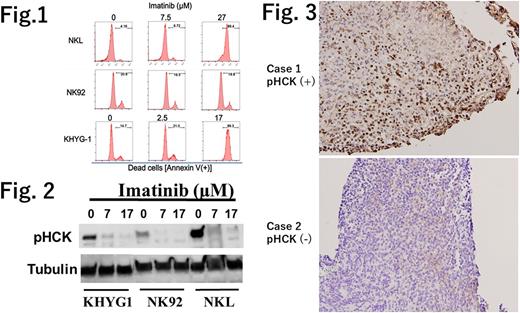Abstract

[Background] Natural killer and T (NK/T)-cell malignancies are uncommon in Western countries but relatively frequent in Asia. Although regimens that include L-asparaginase have improved outcomes, these disorders, particularly aggressive NK-cell leukemias/lymphomas, have poor prognoses. No molecular-targeting drugs have been developed so far. Current reports have provided evidence that a subset of NK cell malignancies is of myeloid origin. Some tyrosine kinase inhibitors (TKIs) that target multiple kinases, including LcK involved in the growth of myeloid malignancies, may therefore show inhibitory effects against NK/T cell neoplasms where LcK members are highly expressed. We investigated the potential anti-tumor activities of multitarget TKIs against malignant NK/T cell neoplasms. [Methods and Results] Three TKIs (imatinib, nilotinib, and dasatinib) were tested for their apoptosis-inducing activities against various NK cell lines including KHYG1, NK92, and NKL after 24-h incubation. Therapeutic doses of imatinib (7.5-27 µM) induced variable annexinV(+) cells in 5 out of 7 NK lines, ranging from 27.1%±6.9% to 87.8%±3.3% (Figure 1), while the apoptosis-inducing effects of therapeutic doses of nilobinib and dasatinib were marginal. Membrane array screenings, which can quantitate 43 phosphorylated proteins, showed that hematopoietic cell kinase (HcK) was constitutively active in KHYG1 cells, and treatment with imatinib inhibited pHcK by 80%. Other known imatinib-targets, including PDGFR, LcK, c-kit, and BCR/ABL, were undetectable in the NK cell lines tested. Further immunoblot analyses using anti-pHcK antibodies confirmed pHcK inhibition in imatinib-treated KHYG1 and NKL (Figure 2). Immunohistochemistry studies with anti-pHcK antibodies revealed two of eight extranodal NK/T-cell lymphomas, nasal type, to be strongly positive for pHcK (Figure 3). In addition, immunohistochemistry studies revealed that NAD(P)H dehydrogenase, quinone 2 (NQO2), a lesser-known imatinib target, was highly expressed in tumor tissues of all seven NK/T-cell lymphoma patients examined, including two pHcK(+) patients, and in vitro studies showed 50% NQO2 protein downregulation and 80% inhibition of its enzymatic activity in imatinib-treated cells. Notably, imatinib enhanced the pro-apoptotic and anti-proliferative activities of L-asparaginase against malignant NK and T cells (CI 0.77 and 0.86 respectively). [Conclusions] Imatinib induces the apoptosis of a subset of NK/T cell malignancies by inhibiting pHcK and NQO2. Imatinib and HcK inhibitors may have therapeutic potential against NK/T cell malignancies either alone or in combination with L-asparaginase.
No relevant conflicts of interest to declare.
Author notes
Asterisk with author names denotes non-ASH members.

This icon denotes a clinically relevant abstract


This feature is available to Subscribers Only
Sign In or Create an Account Close Modal